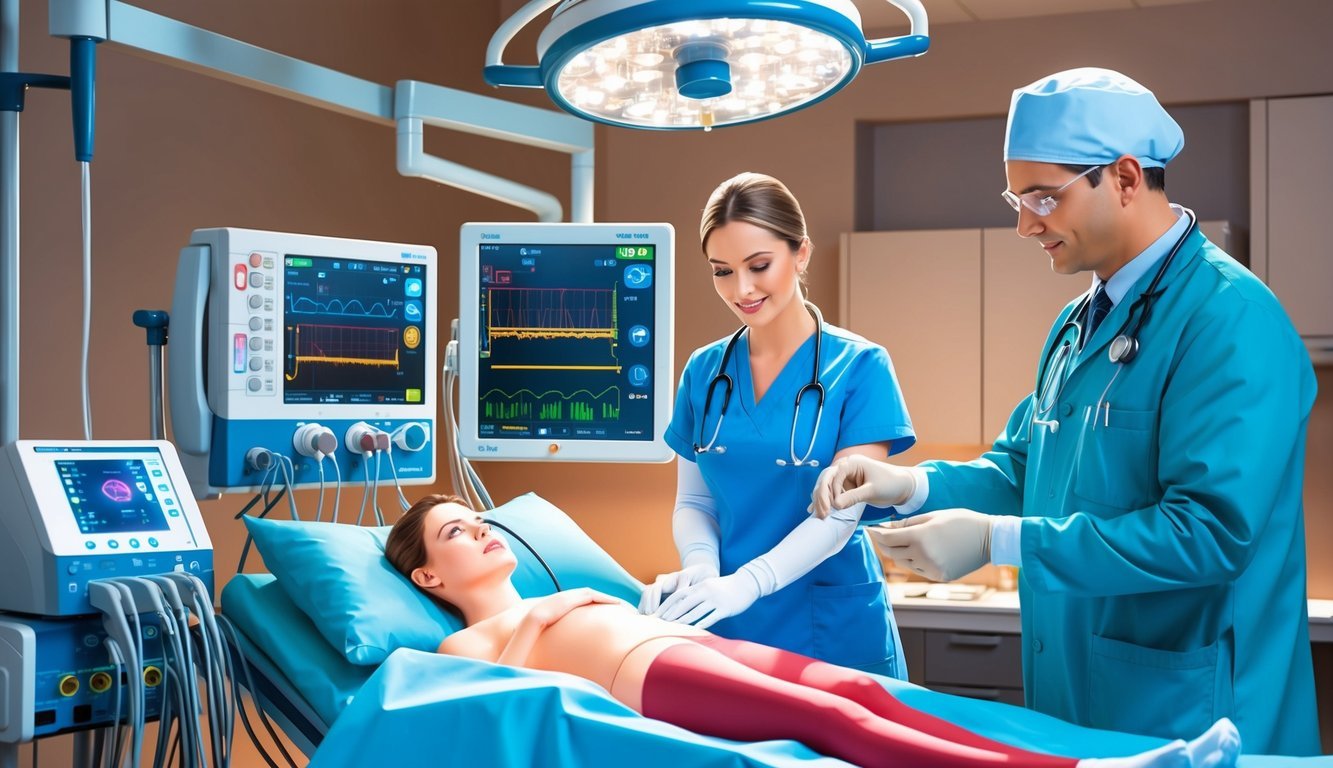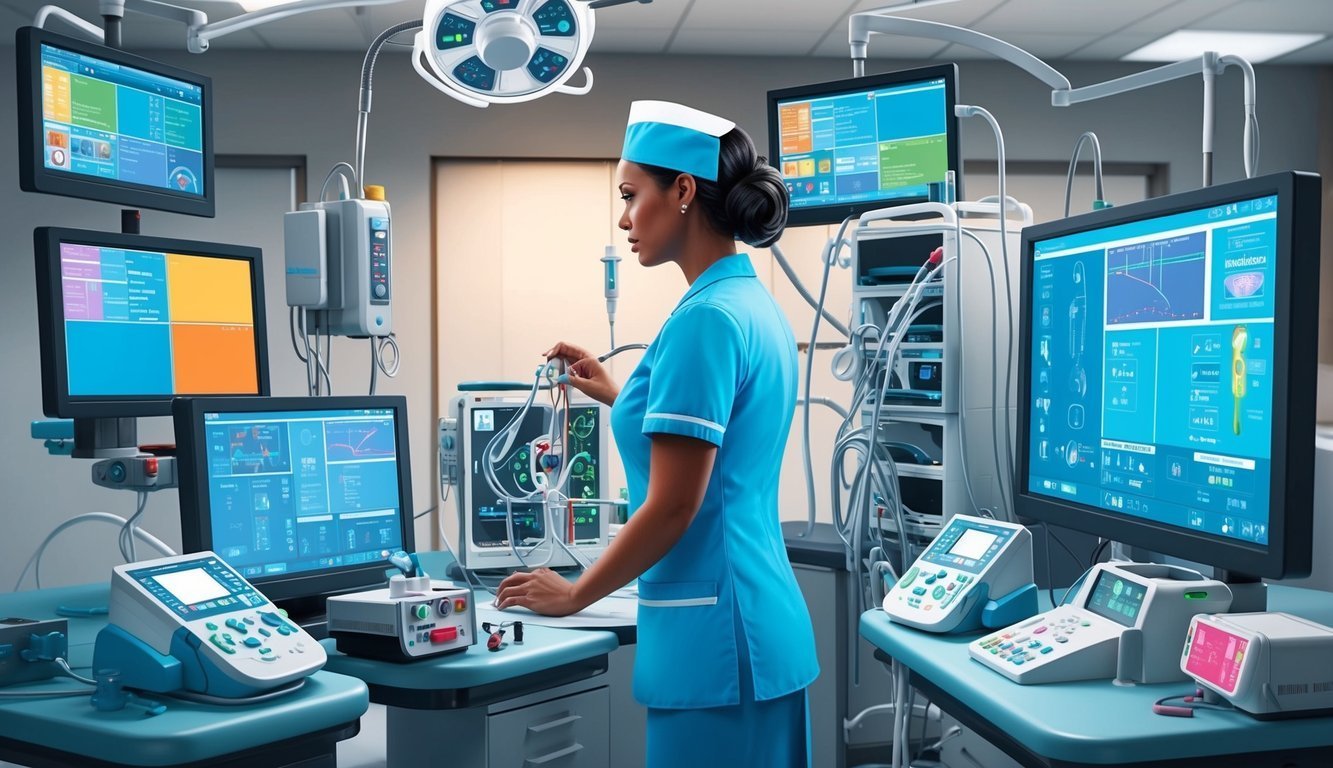As a cath lab nurse, you play a crucial role in the healthcare system by assisting in cardiac procedures.
This position combines technical skills with direct patient care, making it both challenging and rewarding.
Your work involves helping doctors with catheterizations and closely monitoring patients during these critical procedures.
To become a cath lab nurse, you typically need a nursing degree and specialized training.
The work environment can be fast-paced, requiring strong clinical skills and quick decision-making.
You will face unique challenges, such as managing high-stress situations, but you’ll also experience significant rewards, including the satisfaction of contributing to patient health.
Key Takeaways
- Cath lab nurses assist in important cardiac procedures to ensure patient safety.
- Specialized training and nursing credentials are essential for this career.
- The role offers both challenges and rewards, making it a dynamic field in nursing.
Becoming a Cath Lab Nurse
To start a career as a Cath Lab Nurse, you need specific education and credentials.
Understanding the necessary qualifications will help you prepare for this rewarding role.
Educational Requirements
To become a Cath Lab Nurse, you must first be a Registered Nurse (RN).
This typically requires completing either an Associate Degree in Nursing (ADN) or a Bachelor of Science in Nursing (BSN).
| Degree Type | Duration | Key Focus |
|---|---|---|
| Associate Degree in Nursing | 2 years | Basic nursing skills |
| Bachelor of Science in Nursing | 4 years | Advanced nursing concepts |
After earning your degree, you must pass the NCLEX-RN exam to obtain your RN license.
This exam tests your knowledge and skills in nursing practices.
Once licensed, gaining experience in critical care or cardiac care units can be beneficial.
Certification and Specialization
Once you are a licensed RN, further certifications can enhance your skills as a Cath Lab Nurse.
The American Nurses Credentialing Center (ANCC) offers various certifications, including the Critical Care Registered Nurse (CCRN) and Cardiac Vascular Nursing Certification.
To excel in this specialty, obtaining the Advanced Cardiac Life Support (ACLS) certification is also essential.
It prepares you to handle emergencies effectively during procedures.
Additionally, gaining experience in catheterization procedures will make you a stronger candidate.
Specialized training can often be obtained through your employer or through organizations focused on cardiac nursing.
Pursuing these certifications can lead to higher earning potential and improved job opportunities in the field.
The Role of a Cath Lab Nurse
As a Cath Lab Nurse, you play a crucial role in various stages of cardiac procedures.
Your responsibilities include preparing patients, assisting during procedures, and providing care after the procedure.
Each of these stages requires specific skills and knowledge to ensure patient safety and the success of interventions.
Pre-Procedure Duties
Before any cardiac procedure like cardiac catheterization or balloon angioplasty, your tasks include thorough patient assessments and education.
You collect the patient’s medical history, check vital signs, and review their medications.
It’s essential to explain the procedure to the patient, which helps in reducing anxiety.
Ensuring informed consent is obtained is also critical.
Your technical skills come into play as you prepare the necessary equipment and maintain a sterile environment.
You also monitor patients for any potential complications, ensuring that they are stable and suitable for the procedure.
Intra-Procedure Responsibilities
During the procedure, your role becomes vital.
You assist the physician with tasks such as patient sedation and monitoring vital signs, ensuring that all parameters are stable throughout the intervention.
You may be involved in various interventional procedures like stent placement or valve replacement.
Your critical thinking skills are crucial here, as you must quickly respond to any changes in the patient’s condition.
You keep accurate patient charting, documenting details such as medication dosages and any observations made during the procedure.
This ensures that the entire medical team stays informed and can act accordingly.
Post-Procedure Care
After the procedure, your focus shifts to recovery and monitoring.
You ensure that patients are stable post-sedation and that their vital signs are within normal limits.
This phase includes providing clear instructions for recovery and managing any pain or discomfort.
You also educate patients on what to expect during recovery, including information about signs of potential complications.
Your role in patient care continues as you will guide them in their recovery process.
By providing comprehensive post-procedure care, you help ensure a smoother recovery for the patient.
You might also need to assist with heart ablation procedures if necessary, which can further enhance the patient’s recovery.
Clinical Skills and Knowledge
As a cath lab nurse, you must have a strong foundation in both core competencies and specialized techniques.
Your ability to communicate effectively with patients and their families is equally important in ensuring quality care.
Core Competencies
Core competencies include essential skills that every cath lab nurse must possess. Basic Life Support (BLS) and Advanced Cardiac Life Support (ACLS) certifications are critical.
These certifications prepare you for emergencies during procedures, ensuring you can respond swiftly and effectively.
Other necessary skills include:
- Technical Skills: Knowledge of catheterization equipment and procedures.
- Cardiology Nursing Procedures: Proficiency in performing diagnostic and interventional procedures.
- Patient Charting: Accuracy in documenting patient care and responses.
Being well-versed in these core areas forms the backbone of your role in the cath lab.
Specialized Techniques
Your role as a cath lab nurse involves a variety of specialized techniques specific to cardiac care.
These techniques often include:
- Diagnostic Procedures: Skills for conducting tests like angiograms and stress tests.
- Electrophysiology Procedures: Involvement in procedures such as ablations or pacemaker insertions.
- Patient Sedation: Understanding sedation protocols to ensure patient comfort while maintaining safety.
Familiarity with these specialized techniques allows you to participate actively in complex procedures.
Continuous learning and training in these areas will enhance your ability to provide excellent care.
Patient Communication and Education
Communication skills are vital for successfully interacting with patients and their families.
You’ll need to explain procedures clearly and address any concerns.
Patients often experience anxiety, so your ability to provide reassurance and support is key.
In addition, educating patients about:
- Post-Procedure Care: Instructions for managing recovery.
- Lifestyle Changes: Importance of diet, exercise, and medication adherence.
Effective communication enhances the patient experience and improves health outcomes.
Being able to articulate complex medical information in simple terms helps build trust and understanding.
Incorporating these skills into your daily practice will make you a vital member of the cath lab team.
Consider exploring resources on cardiac nursing techniques for more information.
Work Environment and Career Progression
The work environment for cath lab nurses is dynamic and critical, focusing on patient care in specialized settings.
Career progression opportunities are significant, allowing you to advance through various roles in the healthcare system while enjoying competitive compensation and benefits.
Typical Work Settings
As a cath lab nurse, you will primarily work in a Cardiac Catheterization Laboratory within hospitals, including trauma hospitals and critical care units.
These environments are fast-paced, often requiring you to perform under pressure and collaboratively with healthcare professionals, such as radiologists and critical care nurses.
Your duties may include preparing patients for procedures, monitoring vital signs during catheterizations, and providing post-procedure care.
The working hours can be irregular, including nights, weekends, and holidays, due to the nature of cardiac emergencies.
Maintaining a sterile environment and ensuring patient safety are top priorities in these settings.
Advancement and Opportunities
Career advancement for cath lab nurses is promising.
With experience and additional education, such as obtaining a Cardiac Vascular Nursing Certification, you can pursue higher roles.
Many nurses transition into positions like clinical educators, managers, or even advanced practice roles in the cardiac unit.
Continuing education is crucial for growth.
Participating in workshops, seminars, or specialized training can help enhance your skill set.
This ongoing learning can open doors to roles that include leadership or focused expertise in areas like critical care nursing.
Compensation and Benefits
Cath lab nurses enjoy competitive compensation.
According to various sources, salaries range significantly based on experience and location, averaging between $80,000 to $156,358 annually.
Hourly pay typically falls between $34.81 to $88.00, depending on your skills and certifications.
Besides salary, many employers offer substantial benefits.
These may include health insurance, tuition reimbursement for further education, and 401(k) plans.
Additionally, overtime pay and bonuses can enhance your overall compensation, making this role not only fulfilling but also financially rewarding.
Challenges and Rewards of Cath Lab Nursing

Cath lab nursing presents unique challenges and significant rewards.
You must navigate high-stakes environments while providing critical care to cardiac patients, utilizing specialized equipment, and responding to emergencies effectively.
Understanding Risks and Emergencies
As a cath lab nurse, you’re constantly faced with risks related to cardiac care.
Cardiac emergencies, such as heart attacks or arrhythmias, can occur suddenly, requiring rapid response.
Your role involves monitoring patients closely for complications during and after procedures.
Understanding cardiovascular anatomy is crucial to this.
You must be able to recognize signs of heart failure and other cardiac diseases quickly.
Additionally, using specialized equipment like catheterization tools and imaging devices comes with risks.
You need to ensure patient safety by adhering to protocols and maintaining effective communication with your team.
Being prepared for unexpected events cannot be overstated.
Career Fulfillment
Despite the intense challenges, cath lab nursing offers tremendous career fulfillment.
You play a key role in making a positive impact on cardiac patients’ lives.
Helping patients during critical procedures can be deeply rewarding.
You’ll witness firsthand the improvements in patient health, bringing a sense of achievement that is hard to find in other nursing specialties.
Further, the skills and knowledge you gain in critical care nursing create opportunities for advancement.
You may pursue certifications or additional training, leading to higher salaries.
Cath lab nurses in the U.S. typically earn between $80,000 and $106,000 annually.
This financial stability, along with the emotional rewards of patient care, makes for a compelling career choice.
By embracing both the challenges and the rewards, you can thrive in this dynamic field, making a significant difference in cardiovascular care.
For more insights on cath lab nursing, you can visit resources like AMN Healthcare.
Frequently Asked Questions

Cath lab nurses play a vital role in the healthcare system.
They have specific responsibilities, qualifications, and training pathways.
Below are some common questions and detailed answers about the profession.
What are the primary responsibilities of a catheterization laboratory nurse?
Cath lab nurses are responsible for preparing patients for procedures, monitoring vital signs, and assisting physicians during catheterizations.
They educate patients about the procedure and ensure a safe recovery afterward.
Their expertise in cardiac care is crucial in high-pressure situations.
What qualifications are necessary to become a catheterization laboratory nurse?
To become a cath lab nurse, you must have a valid nursing degree and a registered nurse (RN) license.
Most employers prefer candidates with experience in critical care or cardiology nursing.
Advanced certifications can also enhance your qualifications and job prospects.
What type of training do cath lab nurses undergo?
Typically, cath lab nurses receive on-the-job training once hired.
This training includes education on equipment used in procedures, patient management, and emergency protocols.
Many hospitals also provide specialized training sessions to keep skills current.
What certifications are available for cath lab nurses, and how do they enhance the nurse’s capabilities?
Several certifications are available for cath lab nurses, including the Certified Cardiovascular Nurse (CCRN) and the Cardiac Electrophysiology Nursing (CEN) certification.
These certifications demonstrate advanced knowledge and skills in cardiac care, making you a more competitive candidate in the job market.
How does the salary of a cath lab nurse in the US compare to other nursing specialties?
The median salary for a cath lab nurse is around $140,603 per year.
This salary can vary based on experience, education, and location.
Compared to other nursing specialties, cath lab nurses typically earn competitive wages, often higher than many general nursing positions.
What aspects of cath lab nursing are typically considered most challenging?
One of the most challenging aspects is managing high-stress situations during procedures.
You also need to be prepared for emergencies and complex patient conditions.
The need for continuous education in rapidly evolving technology can be demanding but is crucial for success.

